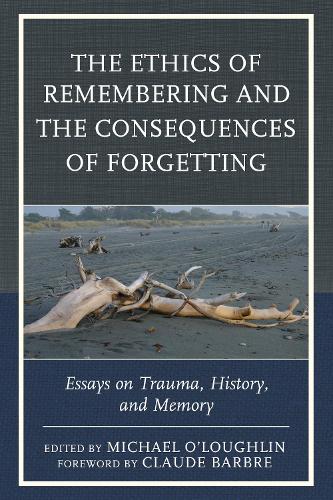
The Ethics of Remembering and the Consequences of Forgetting: Essays on Trauma, History, and Memory
(Hardback)
Publishing Details
The Ethics of Remembering and the Consequences of Forgetting: Essays on Trauma, History, and Memory
By (Author) Michael O'Loughlin
Foreword by Claude Barbre
Contributions by Ricardo Ainslie
Contributions by Claude Barbre
Contributions by Scott Boehm
Contributions by Marilyn Charles
Contributions by Naama de la Fontaine
Contributions by Justina K. Dillon
Contributions by Minh Truong-George
Contributions by Hannah Hahn
Bloomsbury Publishing PLC
Rowman & Littlefield Publishers
18th December 2014
United States
Classifications
Professional and Scholarly
Non Fiction
Clinical psychology
150.195
Physical Properties
Hardback
406
Width 163mm, Height 239mm, Spine 35mm
735g
Description
The Ethics of Remembering and the Consequences of Forgetting: Essays on Trauma, History, and Memory brings together scholars from a variety of disciplines that draw on multiple perspectives to address issues that arise at the intersection of trauma, history, and memory. Contributors include critical theorists, critical historians, psychoanalysts, psychotherapists, and a working artist. The authors use intergenerational trauma theory while also pushing and pulling at the edges of conventional understandings of how trauma is defined. This book respects the importance of the recuperation of memory and the creation of interstitial spaces where trauma might be voiced. The writers are consistent in showing a deep respect for the sociohistorical context of subjective formation and the political importance of recuperating dangerous memorythe kind of memory that some authorities go to great lengths to erase. The Ethics of Remembering and the Consequences of Forgetting is of interest to critical historians, critical social theorists, psychotherapists, psychosocial theorists, and to those exploring the possibilities of life as the practice of freedom.
Reviews
This is a collection of essays that make important historical events come alive in a direct and vivid manner through the lens of trauma. A vast reach of geographical spaces and historical moments are captured, not only from a therapeutic perspective, but also through other ways of engaging trauma, namely art therapy, critical history, and many other discursive positions. This unusual approach makes this volume so special. -- Ingo Lambrecht, Manawanui, Maori Mental Health Services, Auckland District Health Board, New Zealand
This book is both thought provoking and morally challenging. Our heritage of uninvited ghosts that haunt our personal, cultural, and socio-political histories where traumatic memories are repressed yet transmitted to subsequent generations is brought home as each chapter unfolds with vivid accounts of unbearable inhumanity and inspiring threads of human recognition. The ghosts of collective trauma, unwanted social memory and inconvenient truth are everywhere. This book is essential reading to any scholar, social theorist, psychoanalyst or psychotherapist who recognises that globally more and more individuals are being forced by birth or citizenship to have to deal with human violations committed in their name. -- Cora Smith, University of the Witwatersrand, South Africa
A truly excellent and impressive collection for quality and range, this book brings to light, and brings light to, many dark events in human history. Its near-global set of case studies and intergenerational dimension makes this a must read for anyone interested in understanding the historical, psychological and socio-political dimensions of trauma. -- Lita Crociani-Windland, PhD, University of the West of England
Author Bio
Michael OLoughlin, PhD,is professor in the School of Education and clinical and research supervisor in the PhD Program in Clinical Psychology at Adelphi University.
